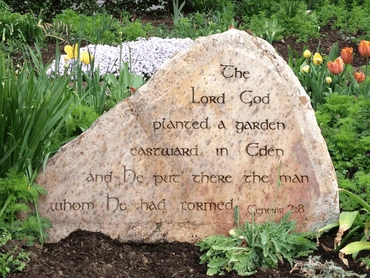Explanation of Genesis 2:17
Napsal(a) Brian David

There is, for everyone, a crossroads when it comes to spiritual things, a basic decision to be made. Are you going to believe in the Lord and in spiritual reality? Or are you only going to believe what you can see, touch, feel and otherwise "know" from your own mind? The Writings say those who choose the latter course are closing themselves off from the truth, because by definition spiritual reality cannot be seen, touched, felt or otherwise "known" through purely human means. That's what it means to eat "of the tree of the knowledge of good and evil," and it leads to spiritual death – which is being cut off from the goodness and truth the Lord wishes to bestow on us.
The people of the Most Ancient Church were in a state of love to the Lord, and had been invited to gather all the wisdom and knowledge flowing from that love – the fruit of all the other trees. But they had to accept the Lord as the source, had to accept that He existed, had to accept that He was infinite and beyond their finite understanding. To think otherwise – to think that through their own minds they could explain the Lord – would be to put themselves above him, and lead them into evil.
It's worth noting that this was not a call for people to shut down their minds. The fruit of the other trees represents an incredible bounty of exploration, learning and wonderment. And we're not called on to shut down our minds today; the Lord gave us our intellectual faculties for a reason. To let the Lord in, though, we have to accept the unprove-able idea that He is love itself and reality itself, and see all other knowledge in that light.
(Odkazy: Arcana Coelestia 126-132, 127, 128-134, 129, 0130)
Arcana Coelestia # 768
768. 'Noah' means what belonged to that Church, and 'Shem, Ham, and Japheth' what belonged to the Churches that derived from it. This is clear from the fact that here they are not called simply 'his sons', as they were previously in verse 7, but that their names are added as well. When their names are mentioned in this way they mean the member of the Church. The member of the Church is not only the Church itself, but also everything belonging to it. It is a general term embracing whatever belongs to the Church, as stated already in reference to the Most Ancient Church which was called Man, and likewise in reference to the others mentioned by name. 'Noah' therefore and 'Shem, Ham, and Japheth' mean whatever belongs in its entirety to the Church and to the Churches deriving from it.
[2] Such is the style and manner of expression used in the Word. For example, when Judah is mentioned in the Prophets it means in most cases the celestial Church or whatever belongs to that Church. When Israel is mentioned it means in most cases the spiritual Church or whatever belongs to that Church. And when it is Jacob it means the external Church. For with every member of the Church there exist the internal aspect of the Church and the external. The internal is where the true Church is to be found, while the external is what derives from it, which is Jacob.
[3] It is different when they are not mentioned by name, for the reason that in that case they relate to the Lord's kingdom in a representative fashion. The Lord is the only Man, and is the All of His kingdom. And because the Church is the Lord's kingdom on earth, the Lord alone is the All of the Church. The All of the Church is love or charity, and therefore 'man', or what amounts to the same, someone who is mentioned by name means love or charity, that is, the All of the Church. 'Wife' in that case means quite simply the Church that comes from it, as is also the case here. The character of the Churches meant by 'Shem, Ham, and Japheth' however will in the Lord's Divine mercy be discussed later on.






